'My husband died, and I still have many unanswered questions'
- Published
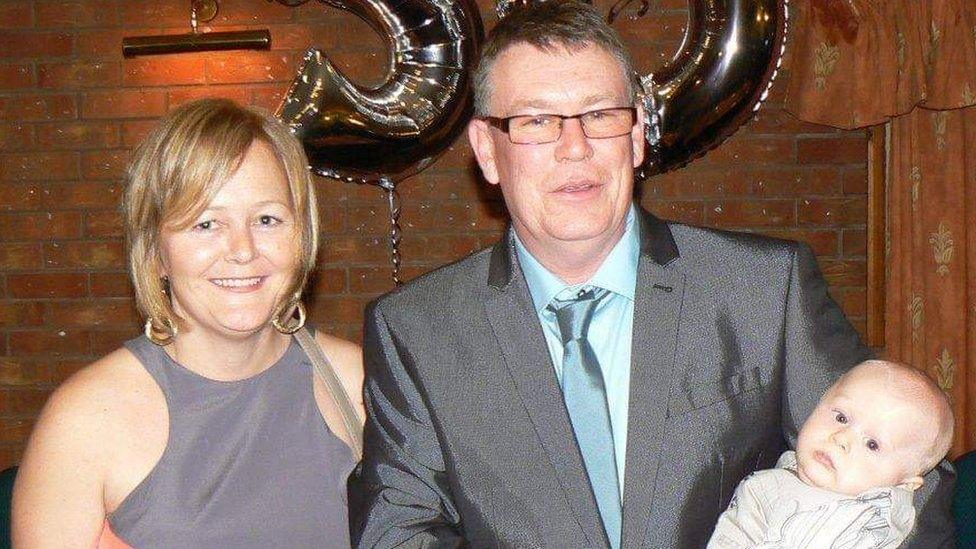
Debbie, Lex and baby Vincent
A six-year-old boy has won the right to sue for damages over the death of his father in a landmark ruling at the Supreme Court in London. Vincent Warner had no time to get to know his dad, Lex, before a catastrophic set of circumstances in the sea off the north of Scotland led to his death six years ago.
Rewind to the morning of Tuesday 14 August, 2012.
Lex Warner is on the deck of the MV Jean Elaine, a dive boat a recreational dive team called Dark Star had hired from Scapa Flow Charters in Stromness.
They had overnighted at Kinlochbervie, and today they expect to sail out to Cape Wrath to dive an unexplored wreck.
Skipper Andy Cuthbertson breaks some bad news: the weather is poor. He advises the group they shouldn't dive.
Dark Star is an informal group of experienced technical divers. It's the sort of group you need an invitation to join.
This is the second trip that Lex, who hails from Sutton Coldfield, has taken with them. The 50-year-old is an experienced recreational diver and got his 100m (328ft) diving certificate three years previously, but today is the first time he's planned to go that deep.
Technical diving is dangerous. There is so much pressure on the body decompression stops are necessary, as is specialist breathing equipment and different gas sources.
Later on in the day on 14 August, the weather improves and Andy Cuthbertson gives the go ahead to approach the wreck, some 15 miles north west of Cape Wrath.
Dark Star has a system of entering the water in close succession to maximise decompression requirements and a slack tidal stream. It means they don't dive with a buddy as such.
Lex sits on the bench in full kit: fins, gloves, face mask, rebreather equipment on his back, three bail out bottles on his sides, a torch, surface marker buoys and dive computers.
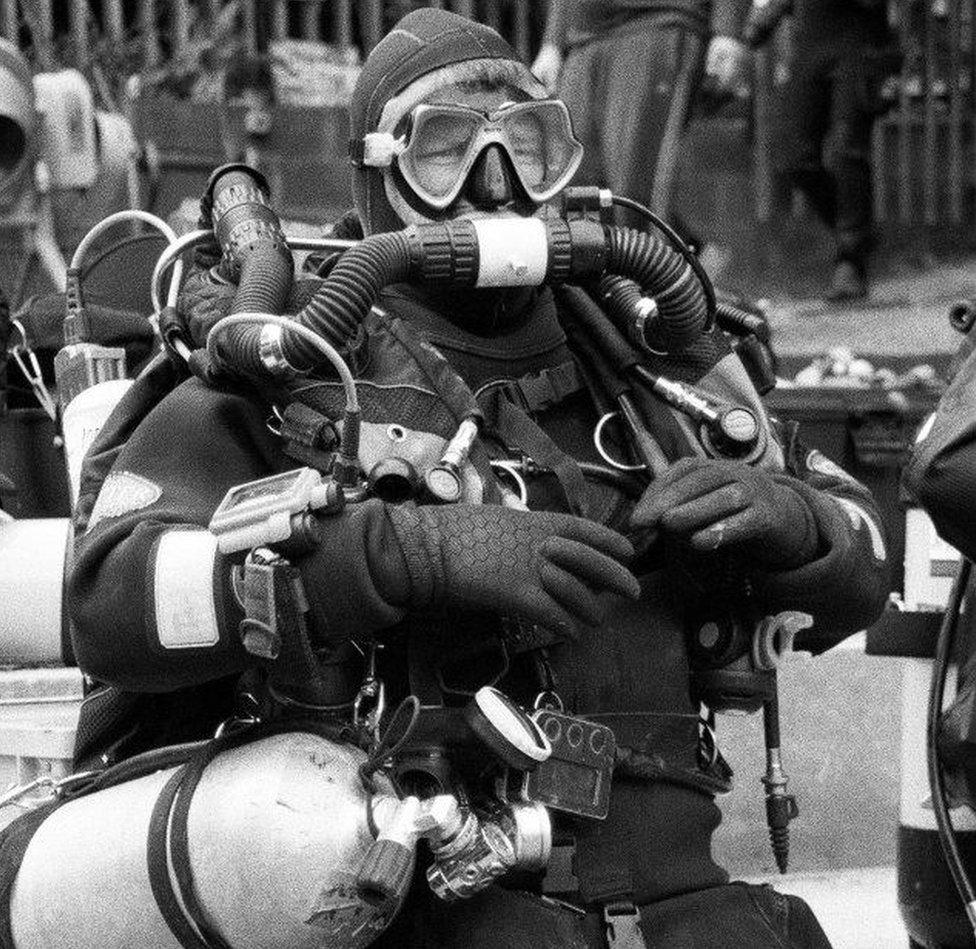
Lex in his diving gear
The fall
At 16:07, it's his turn. But when he stands up he falls heavily onto his hands and knees. His fins are trapped upwards, which forces him to roll onto his side and then his back.
Now it's become impossible for Lex to get himself up.
Andy Cuthbertson and deckhand Allan Stanger go to help, and after considerable effort they manage to get him on his feet.
Lex is asked if he feels OK to dive. He nods, indicating he is. Two minutes after getting up from a serious fall, Lex is in the water and starting the dangerous descent to 100m.
Health and Safety Executive (HSE) accepted code of practice for recreational dives states there should be one person in overall charge of the dive - the diving contractor. This would include questioning someone's fitness to dive.
The Dark Star team are all experienced divers, but they don't follow this code of practice and no-one was nominated to be in charge of safety. There was no dive contractor: there was no-one to assess Lex's fitness to dive.
The dive
Lex is seen at 40m and 70m swimming well.
At 88m, only nine minutes into his dive and just over 10 minutes since the fall, his dive computer shows he turns around and begins the much longer journey back to the surface. His breathing is normal.
By the time Lex reaches his colleagues less than 20m above him, he's struggling to breathe and gain control of his buoyancy. He needs to be buoyant in order to surface. They try to calm him, but he's intent on hauling himself up the line to reach the surface.
One of the divers goes after him and 10m later he finds Lex doesn't have any breathing equipment in his mouth. He tries to give Lex air, but can't.
He tries to add air to Lex's suit to help him stay buoyant, but can't. Lex starts to sink.
Two other divers come to help, but the three of them can't hold him. They have only one option: they inflate the emergency lifting bag which shoots Lex from 65m to the surface.
All this takes less than 20 minutes. The time is 16:28.
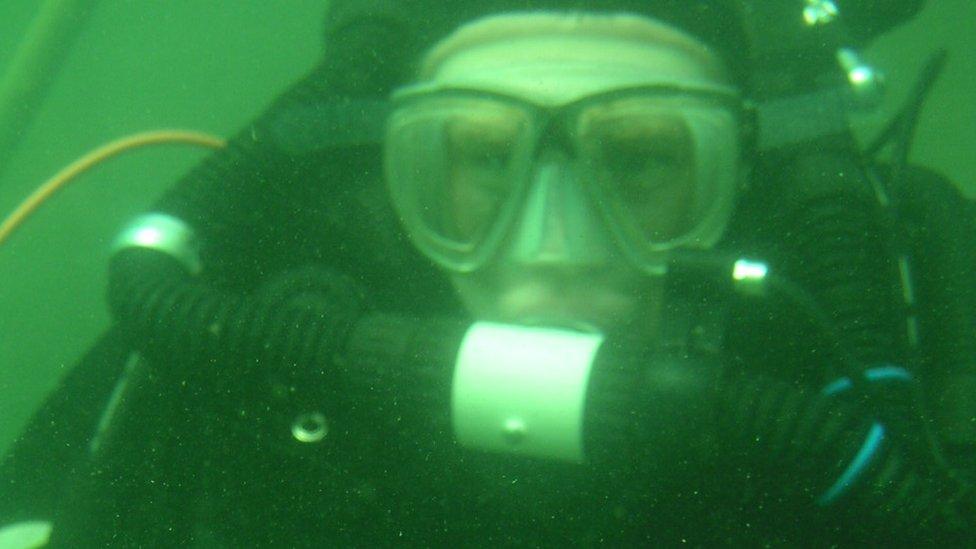
Once at the surface, Lex is winched onto the deck of the Jean Elaine, and divers on the deck cut open his dry suit to start CPR.
At 16:43, skipper Andy Cuthbertson calls the coastguard to report an unconscious diver and after some negotiation, a helicopter casualty evacuation.
It arrives at 17:09 and Lex is taken to the Western Isles hospital in Stornoway, where he's declared dead.
Lex's wife Debbie is pregnant and had only a few days before broken the news to her husband. Son Vincent is only nine months old at the time of his father's death.
This much is established fact.
'Deep shock'
"I was numb," says Debbie.
"I got a knock on the door from the police at 2pm the day after, 20 hours after he died. You go into shock - I saw two coppers at the gate, and I initially refused to answer the door in case something had happened.
"They asked twice for my husband, but when they came in and said they'd received notification from Scotland that Lex had died.
"I went into deep shock. I didn't cry or anything.
"I had to ring Kirkwall police, who asked me to call Raigmore Hospital in Inverness, and I had to wait another day before I was given the go ahead to travel.
"When I got to the hospital they told me Lex was brought in as a John Doe which was the reason for the delay.
"They had no knowledge of how he'd died, but they'd found injuries not consistent with drowning which were life threatening in their own right.
"I'd arranged Lex's funeral on 31 August but it had to be cancelled because the relevant paperwork hadn't been released. Only a few weeks after that I was admitted to hospital suffering a miscarriage."
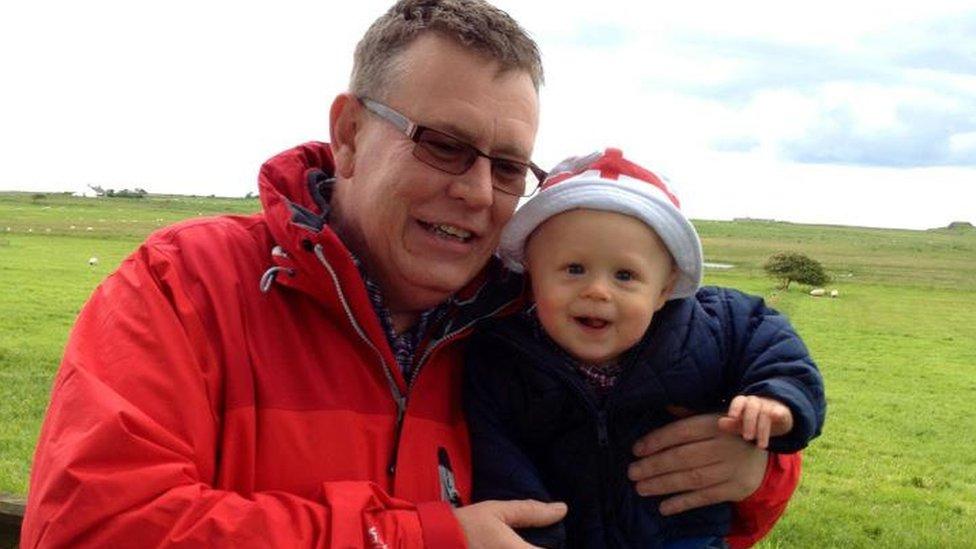
Lex with his young son Vincent
Debbie has raised concerns about the safety record on board the MV Jean Elaine. Lex is the fourth diver to die whilst diving from the vessel. The latest fatality was a 49-year-old man who died in July this year.
The first was Dutchman Martin Voordouw, who died in 2007 whilst diving the German battleship Konig. His body wasn't recovered until 2010 when a group of divers also diving off the Jean Elaine found him and pulled him up, external.
Stuart MacCormac from Cardiff died in 2011 whilst diving the Dresden, a World War One German cruiser scuttled in Scapa Flow.
An inquest found he had a heart condition he'd not been aware of and ultimately this led to his death by drowning. It took three sweeps of the sea bed by his team before they eventually found him.
Overall the average number of diving deaths in the UK is between 11 and 13 a year.
Internal injuries
A number of questions arise from Lex's death, and since then Debbie has been seeking answers.
A post-mortem examination on Lex's body established he'd died from injuries inconsistent with diving. Lex had drowned, but there were significant internal injuries the medical examiner attributed to the fall on deck before Lex entered the water.
Several months later, the Marine Accident Investigation Branch, external (MAIB), whose job it is to investigate serious injury and death at sea, reviewed those findings and disagreed - they said Lex died of decompression sickness as a result of coming to the surface from such a depth.
Ultimately both doctors agreed Lex's internal injuries were a medical emergency in their own right.
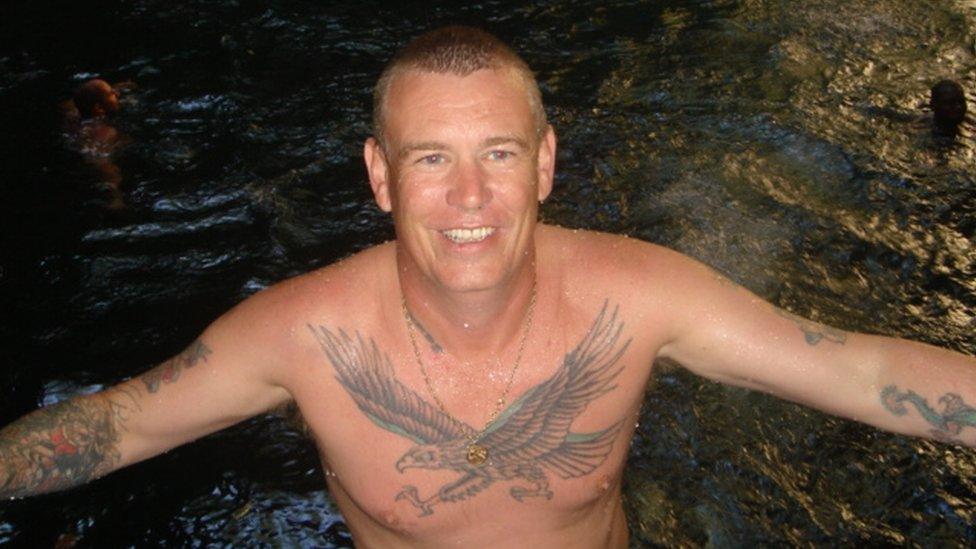
Dr David Wilmot, who is medical advisor to the Scottish Sub Aqua Club and Secretary of the UK Diving Medical Committee, thinks the fall could also have contributed by disturbing Lex's concentration.
He says: "Before all dives whether they be scuba, snorkel or freediving, one goes through a mental state of preparedness. The more complex the dive, the more important is the mental focus.
"Deep technical dives require a very focused mindset as well as a fanatical care in preparing kit. Most of us go into a quiet place to prepare for what is ahead and would not want anything to interrupt that process.
"In Lex's case, the fall might have altered that mindset regardless of any injury.
"Basic diving physiology shows that breathing gases are absorbed into body tissues on descent. As the diver goes deeper, more gas is absorbed until tissues become saturated. Once this occurs, the speed at which a diver can return to the surface is dictated by how quickly this gas can be transferred out of the tissues through the lungs.
"In a deep dive, the ascent is slower and involves several stops to allow this gaseous exchange to occur. These are called decompression stops.
"Missing these stops causes decompression sickness, which can prove fatal."
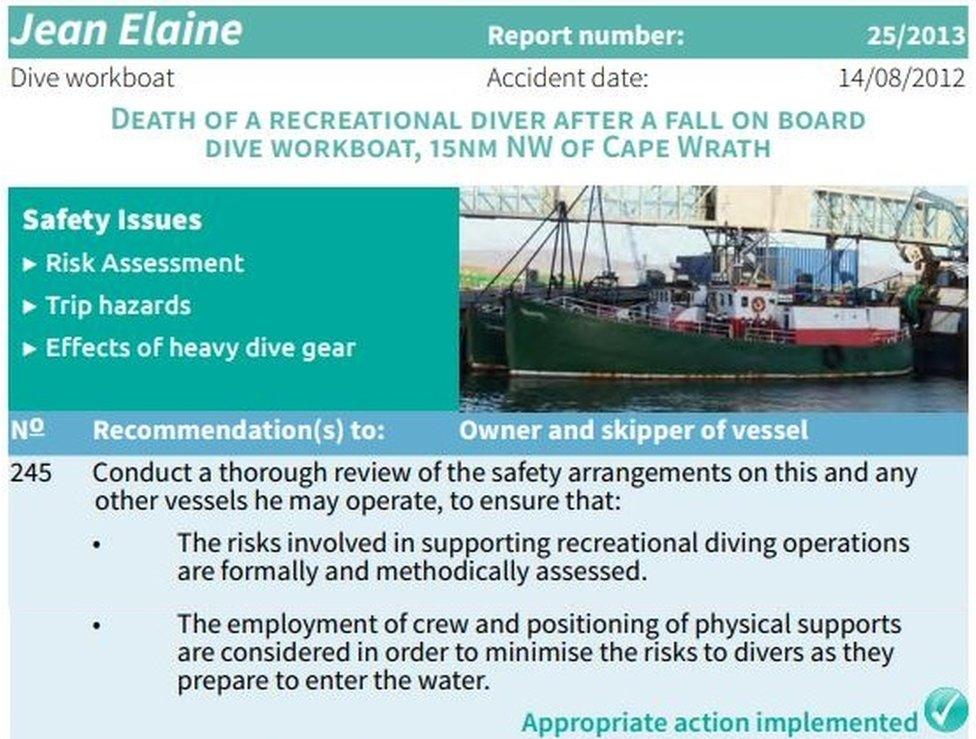
The MAIB made "recommendations" following Lex's death, and said "appropriate action" had been taken
When there is an unexplained and unexpected death in Scotland, the procurator fiscal has a duty to investigate. There was a cursory police investigation which concluded no further action would be taken.
As a matter of law, the MAIB should be notified by the skipper in the case of serious or fatal injury at sea. In March 2013, seven months after Lex's death, Debbie contacted the MAIB.
Initially, they said they weren't aware of the death, and that they didn't investigate diving deaths - it was the responsibility of the HSE. A month later they determined it was within their remit and they made initial contact with Andy Cuthbertson.
The report, external they published in December that year made recommendations regarding safety on board the Jean Elaine, and their 2013 annual report, external showed appropriate action had been taken.
But Debbie feels like she's been pushed between governmental departments without much help.
She says: "I feel like I've struggled on my own without support from any of the agencies that are meant to help you in these circumstances.
"My husband died, and I still have many questions that are unanswered. It's shambolic.
"I don't even know the exact location of where he died. I've been told three different locations by the police, the Health and Safety Executive and the MAIB.
"I can't even go and throw a wreath on the water."

In the middle of this is Debbie's desire to sue Scapa Flow Charters over the death of her husband.
She and her son brought separate actions against the company. Her case was found to be time barred - so her right to sue expired after two years - but her son's was not. However, Scapa Flow Charters disagreed and took their appeal straight to the Supreme Court in London.
The court today ruled that "Mrs Warner's claim as her son's guardian is not time barred" under international maritime rules, meaning the family can sue.
Debbie says: "One of the biggest frustrations is the distance and the difference in the law between England and Scotland.
"I feel unsupported and lost in the system. Even some of Lex's belongings haven't been returned now after all this time.
"Today's judgement means I can finally look at square one, something I've been trying to do for six years, most of my son's life.
"I think this should be a criminal investigation - this is about justice, and the only way it gets sorted and the only way for that to happen is for the facts to be placed before a judge and the truth to be heard."
- Published17 October 2018
